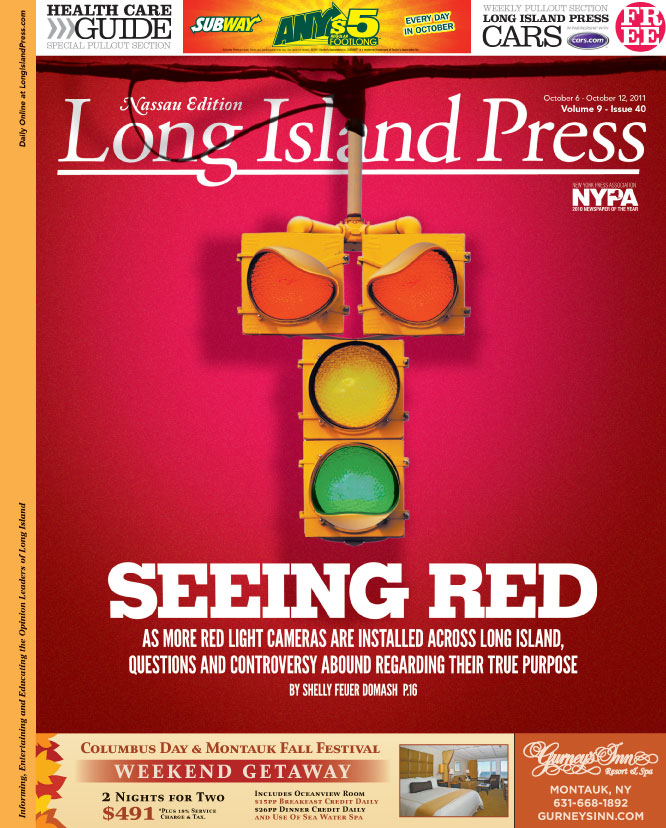
In California, Safer Streets L.A.’s Beeber also took on ATS, discovering similar tactics, as well as other misleading techniques when public sentiment arose against the camera program there.
“They run ads under the name National Coalition for Safer Roads and never tell anyone they are funded and created by the camera companies,” he tells the Press. “They have huge number of lobbyists, and hire people to search online and type up positive information on cameras.
“In L.A., when we had a big debate, they bussed in their employees to speak in favor of cameras, and no one said they were an employee!” he blasts. “We caught them in so many lies.”
Territo defends ATS’ actions in Los Angeles, explaining to the Press: “We brought those people whose jobs were on the line to show their jobs were impacted by the decision the council made and who lived in the city of Los Angeles. We were very open about who they were, open about who they worked for.”
In the end, Beeber won. In late July, the Los Angeles City Council voted unanimously to kibosh the program, following a unanimous recommendation from the city’s police commission a month earlier.
A similar scenario unfolded with another activist more than 1,000 miles away. Last year, Eyman began a campaign to leave the decision whether to use red light cameras up to the public through a ballot in Mukilteo, Wash.
Once again, ATS fought back. Among other tactics, it sent a memo (obtained by the Press) to the mayor expressing its intentions to squash the vote: “We would like to get the Eyman initiative stopped before it goes to a vote. It is a bad [precedent] to have a vote over police powers, and weakens the elected positions. We have hired a strong Seattle attorney firm…but they need a Mukilteo resident to use for the filing.”
The courts in Mukilteo ultimately refused to block a public vote initiative and the citizens got their chance to have their say. Residents voted a 71-percent majority not to allow the cameras into their community, says Eyman.
ATS is fighting to stop other cities in Washington from similar public ballots, though their argument is losing legal steam.
In August, Washington Superior Court Judge Ira Uhrig found that attempts by ATS to stop the city of Bellingham from putting an initiative on a ballot were illegal and violated state law. He imposed a $10,000 fine against ATS, in addition to requiring the company pay for the legal fees of the initiative’s sponsors.
“[O]ther courts have ruled that this is an issue that should be decided by the legislature, not through local initiatives, and we believe that precedent will prevail in an appeal,” argues Territo.
“They don’t play nice,” blasts Eyman. “They don’t care about citizens, the city council, or judges. They just go ahead like a bull in a china shop. They are the schoolyard bullies.”
Activists in Texas were facing other problems with ATS. According to Byron Schirmbeck, director of SaferBaytown.com, ATS was allegedly paying a Baytown police officer on the executive board of the police officers union to publicly support their initiatives.
“Whenever there is an initiative vote, they set up little fake front groups,” says Schirmbeck, adding, “ATS spent over $200,000 in Baytown, Texas for advertising. They violated the Texas ethics commission on political advertising by not putting on political disclaimers.”
“They don’t think the rules of the constitution apply to them,” explains Eyman. “Ethics and ATS are two words that should never appear in the same sentence.”
ATS also made its mark in Arnold, Mo. When Matt Hay, founder of wrongonred.com, was running for re-election as a councilman, he says ATS, through various donors, contributed approximately $17,000 to his opponent, a sum Hay says is unheard of for such a small city election. He has no doubt why.
“One of my goals was basically to get the cameras removed from the city of Arnold,” he says.
Strangely, the day after Hay officially launched his anti-camera website wrongonred.com, a site with a similar address popped up, wrongonred.org,, though it touted a very different message.
It was plastered with disparaging remarks about Hay, he says, including “For the truth about red light cameras in Missouri visit www.wrongonred.org. Matt Hay and his merry men who believe lawbreakers are the victims would love you to go there.”
The website, which records indicate was registered the day after Hay’s site went online, showed no indication it was sponsored by ATS, though Territo, the company’s spokesman, admits he personally created the site, after he was questioned by the Press, explaining: “It is the first pro-camera site that we ever operated. I made it on a whim. It has not been updated.”
Tiffany Sherwood, cofounder of BanCams.com, has found at least 18 pro-camera websites spread across the country that are registered to Advarion, Inc., of Houston, Texas. She claims Advarion has been known to do work for ATS; Territo denies this.
But when specifically asked about one particular site that is registered to Advarion entitled KeepNassauSafe.com, Territo knew about it, saying that it was not up and running. Numerous calls to Advarion from the Press for comment for this story were not returned.
Since ACS, Suffolk County’s vendor, does not list their red-light camera lobbying fees separately from their parent company’s other subsidiaries, there is no way to tell what they have spent. But that company is far from scandal-free.
ACS was accused of vandalizing red light cameras after they lost their bid to ATS in Washington, D.C.—not the first time ACS had been involved in questionable behavior.
In 2006, they were charged with a violation of a Canadian law that prohibits giving, offering or agreeing to give or offer any reward, advantage or benefit in consideration for receiving any favor in connection with a business relationship. The charges were based on allegations that ACS had bribed police over a six-year period in order to land a $90 million contract. A judge later ruled that although the officers involved might have used poor judgment in accepting the gifts, their actions weren’t criminal.
“Generally what happens is they play a political game: schmooze as much as possible,” says Casey Raskob, an attorney who works with the National Motorists Association. He claims the camera companies often go in at the local level and offer things like trips or meals to officials who are not used to getting these perks.
“Someone is throwing free money at you. But then a town tries to get rid of them, only to find they are sued by companies like ATS,” he tells the Press. “It is like getting into bed with the devil. There is no free money, no free candy. They won’t just go away.”
Houston did successfully rid themselves of red light cameras, however. Despite ATS threatening a $25 million lawsuit, a referendum passed in the city calling for the removal of all cameras. Houston shut down the entire program in August.
Just how these multi-million-dollar tickets are officially classified is another volatile issue in the red light camera debate. Instead of constituting a criminal penalty, violations are classified as civil infractions.
“Because they make it a civil matter, they sell it to the public by saying it won’t go on your license,” says Eyman.
This action, he adds, in effect strips accused offenders of their constitutional rights.
“You are assumed innocent until proven guilty,” explains Eyman. “You lose the right to face you accuser. In the criminal process the police officer who gave you the ticket has to show up. You can’t do that with a robot.”
Former Nassau County Judge Levine agrees, arguing that violators are not getting their constitutional right of due process of law. This right includes a presumption of innocence, the ability to confront the accusers and to cross-examine live technicians and witnesses. The motorist is also not getting, according to Levine, a fair hearing with validly appointed judges, and assistance of counsel if the motorist is poor, as well as proper rules of evidence, guilt beyond a reasonable doubt for a conviction, an appeal process, and the protection of defendant’s privileges and constitutional rights. All of these rights would be available if a police officer issued the ticket, he explains.
Many cities are beginning to question the use of cameras, but according to Highway Safety Research and Communications, as of August 2011, 541 communities are using them.





